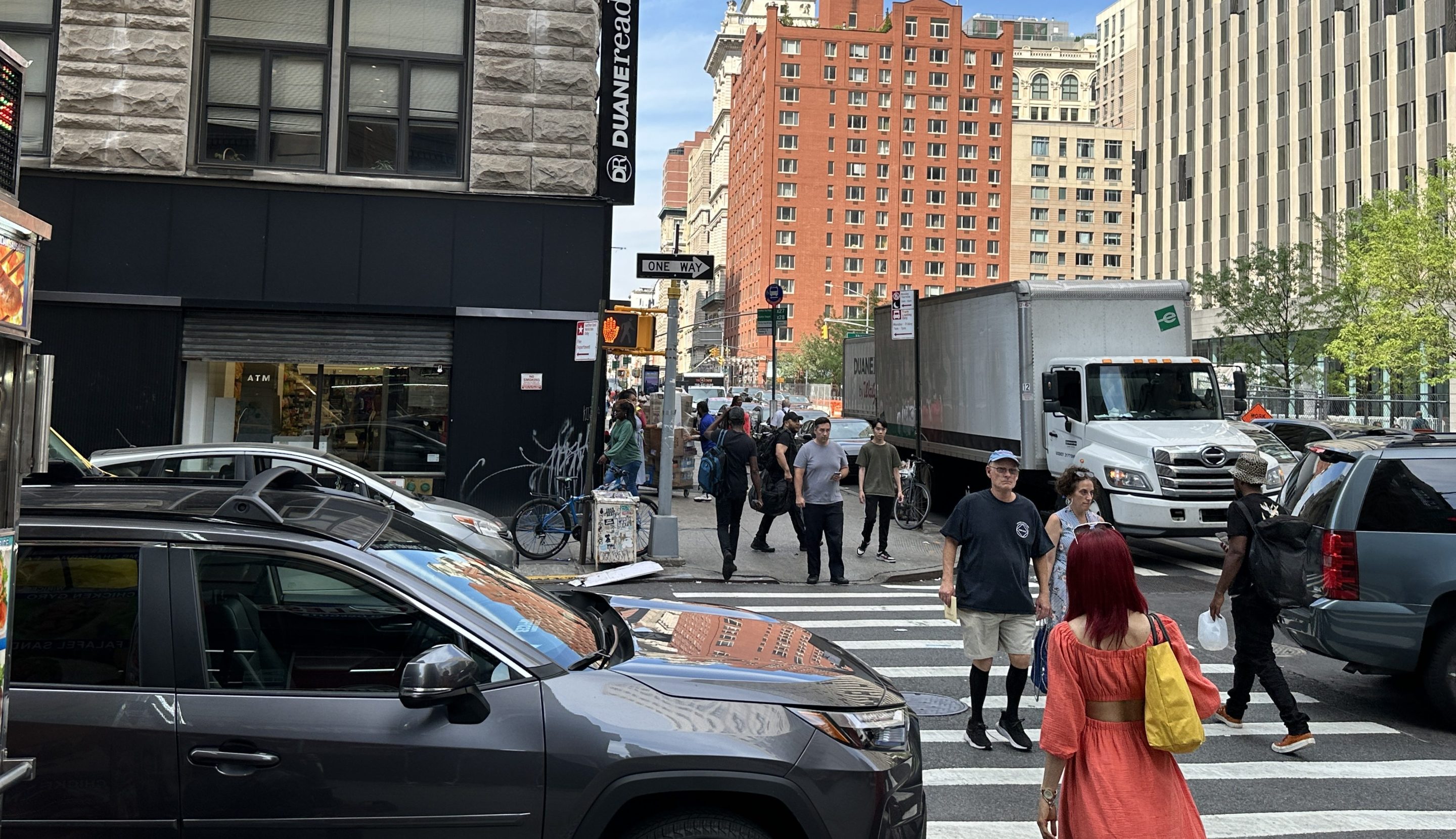City officials came out against a Council bill to legalize so-called "jaywalking," claiming that maintaining the criminality of the widespread practice of crossing the street without a walk light actually keeps New Yorkers safe.
Tickets for crossing against the light or outside of a crosswalk are rare in the city, but NYPD cops overwhelmingly hand out the $250 summonses to people of color — which is why Council Member Mercedes Narcisse aims to simply decriminalize the process of just walkin' here.
But NYPD and Department of Transportation officials were having none of it at a hearing on Tuesday.
"We feel very strongly we should not legalize this and send the message out that it’s OK to walk anywhere at any time," said DOT's First Deputy Commissioner Margaret Forgione. "Pedestrians crossing in a crosswalk at the expected time and the expected place is better for everyone else on the road."
The NYPD has a well-documented history of disproportionately ticketing pedestrians of color for allegedly crossing against a traffic signal, a trend that continued into 2023 with 92 percent of tickets going to Black or Hispanic New Yorkers. That share rose even higher to 96.5 percent for the first three months of this year, Streetsblog recently revealed.
A top cop defended the NYPD's practices, arguing that New York's so-called Finest were keeping people safe by targeting areas with high pedestrian crash numbers.
"I understand the data on the back end is of concern — and it’s of concern to me," said Deputy Chief Thomas Alps of the NYPD's Transportation Bureau. "We have guidelines in place in the police department that prohibits biased-based policing."
Tickets for the criminal offense make up less than 1 percent of NYPD's criminal summonses, Alps said, and 23 of the city's 77 precincts have not written a single fine for it so far this year.
However, there are outliers, like the 115th Precinct in Jackson Heights and East Elmhurst, where cops doled out a whopping 45 tickets year-to-date, more than any other precinct.
The Queens sector also had the most pedestrian fatalities — four — so far in 2024, Alps noted. Three of those happened on 37th Avenue, and the Queens cops gave out three-quarters of all jaywalking summonses "in close proximity" to that corridor, Alps said.
"It gives clear indication that precision policing is taking place," the senior cop said. "There’s fatalities happening here, there’s pedestrians getting struck and injured, this is where need to do it."
The Council's Transportation Chair Selvena Brooks-Powers questioned that rationale, arguing that there are high-crash locations all over the city that don't get the same level of tickets.
"People jaywalk back and forth going across the streets here," said the Queens lawmaker. "In certain communities, Downtown Brooklyn, folks are crossing, I see them jaywalking all the time, they’re not necessarily getting these citations either.
"We want New Yorkers to cross the street safely, but does DOT and NYPD in this instance have any evidence that the law actually deters jaywalking, and how do you reconcile the fact that this law is basically never enforced except largely against Black and Brown New Yorkers," Brooks-Powers added.
Forgione said that 34 percent of pedestrian traffic deaths over the past five years were people crossing "mid-block" or in a crosswalk without a light. The agency supports lowering jaywalking from a criminal offense to a civil penalty, but she shied away from embracing full legalization.
"We are also concerned about this issue [of most tickets going to Black and Brown New Yorkers] that you’re raising, and that is why we believe and we support having jaywalking be a civil offense not a criminal offense," Forgione said. "However, just stating that jaywalking is totally legal, we believe strongly that’s the wrong message to send to New Yorkers."
Advocates slammed the city for standing behind the "outdated" policy they said does not make the streets safer.
"Criminalizing jaywalking makes no one safer," said Elizabeth Adams, interim co-Executive Director of Transportation Alternatives. "The city can protect New Yorkers by redesigning streets to slow down drivers and make pedestrians more visible — especially in areas with high pedestrian fatalities — not criminalizing walking."
Meanwhile, more car-friendly parts of the country, like Denver, and the state of California, have either legalized or partially decriminalized jaywalking, citing the disproportionate enforcement against pedestrians of color.
The term derives from "jay," a slur against country people who don't know how to navigate a busy city street, which the car lobby weaponized in the early 20th century to divert blame for rising traffic violence from drivers to walkers, as automobiles became more common.
New Yorkers in the street near City Hall quickly dismissed the city's wish to keep jaywalking against the law.
"If you are a New Yorker, you jaywalk. It is like almost in your blood, your DNA," said Tiffany Battle.
"I think it's kind of hogwash," added another passerby, Judi Thames Potter. "Jaywalking is just walking, and people shouldn’t be able to be looked up for jaywalking — that’s crazy."
Additional reporting by Ibrahim Hersi






